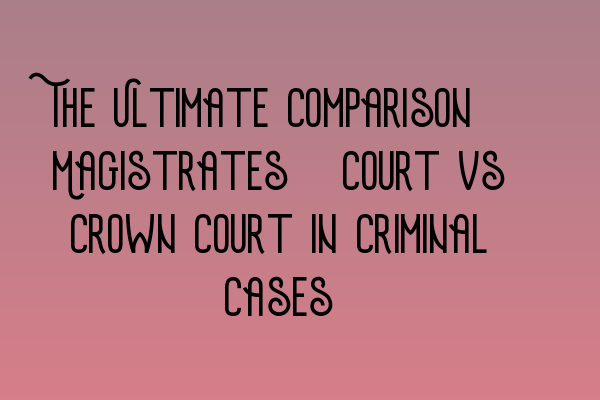The Ultimate Comparison: Magistrates’ Court vs Crown Court in Criminal Cases
When it comes to criminal cases in the UK, there are two main types of courts that handle the proceedings: Magistrates’ Court and Crown Court. Each court has its own jurisdiction and role in the legal system. In this article, we will provide an in-depth comparison of Magistrates’ Court vs Crown Court, highlighting their differences and similarities.
Magistrates’ Court
Magistrates’ Court is the lower criminal court in the UK. It deals with less serious criminal offenses, such as minor assaults, theft, and public order offenses. The court is presided over by magistrates, who are lay volunteers with legal training. There is no jury present in Magistrates’ Court, and the magistrates make decisions on guilt or innocence.
One of the key advantages of Magistrates’ Court is its accessibility. The court is available in almost every town and city, providing easy access for both defendants and victims. The proceedings are generally quicker than in Crown Court, allowing for a faster resolution of the case.
However, Magistrates’ Court has limited sentencing powers. It can impose fines, community service orders, and short custodial sentences. For more serious offenses, the court may transfer the case to the Crown Court for sentencing. Legal representation is available in Magistrates’ Court, and it is advisable to seek expert advice to help navigate the legal process. For those interested in legal representation, check out this article.
Crown Court
Crown Court is the higher criminal court in the UK. It handles more serious criminal cases, including murder, rape, and major fraud. The court is presided over by a judge and a jury of 12 members who decide on guilt or innocence. The decision-making process in Crown Court is more complex and involves a detailed examination of the evidence presented.
Jury trials in Crown Court provide an important safeguard in the criminal justice system, ensuring that decisions are made by a group of unbiased individuals. The court also has higher sentencing powers, including the ability to impose longer custodial sentences.
Unlike Magistrates’ Court, Crown Court is only available in major cities, which can be a challenge for defendants and witnesses who need to travel. The proceedings in Crown Court are more formal and follow a strict procedure.
Choosing the Right Court
The choice of court for a criminal case depends on the seriousness of the offense. Cases in Magistrates’ Court are typically resolved more quickly, while Crown Court trials can take longer.
It is important to seek expert advice to determine the appropriate court for your case. For legal representation and advice in the UK, you can refer to Delaware’s Code of Conduct. Legal counselors can assess the circumstances of your case and guide you through the legal process, ensuring that your rights are protected.
Conclusion
In summary, Magistrates’ Court and Crown Court have their own unique roles in the criminal justice system of the UK. Magistrates’ Court handles less serious offenses, provides accessibility, and has limited sentencing powers. Crown Court deals with more serious cases, involves jury trials, and has higher sentencing powers. Choosing the right court for your case is crucial, and seeking legal representation is highly recommended.
For more information on UK criminal law and the British legal system, you may find this in-depth analysis helpful. Additionally, if you are a UK business facing legal challenges in the U.S., this article on strategies for overcoming hurdles may provide valuable insights.
